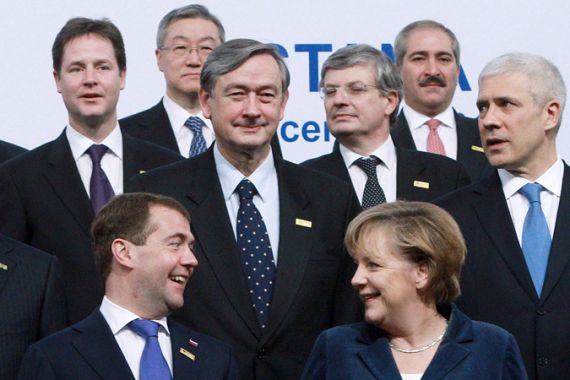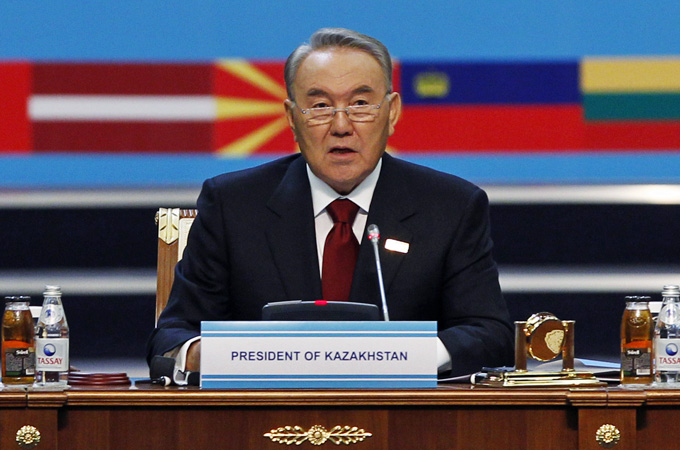Kazakhstan hosts security summit
World leaders meet at OSCE summit to discuss issues ranging from Afghanistan to terrorism and drug trade.

 |
| Kazakhstan’s Nazarbayev urged leaders to revive the role of the OSCE [Reuters] |
The Organisation for Security and Co-operation in Europe opened its summit in Kazakhstan’s capital
to discuss issues ranging from Afghanistan to terrorism and drug trade.
Security was tight as world leaders including Dmitry Medvedev, the Russian president, Hamid Karzai, the Afghan president, and Hillary Clinton, the US secretary of state, got together in Astana on Wednesday.
The summit is the first to be held in 11 years and Nursultan Nazarbayev, the Kazakh president, urged participants to take the opportunity to revive the role of Europe’s main security watchdog.
“This summit is a sign of the rebirth of the organisation,” Nazarbayev said as he declared the summit open.
Several of the 38 heads of state attending the summit echoed the need for the OSCE to create universal rules to tackle conflict and to intervene quickly and decisively where needed.
“This organisation has really started losing its potential. We should put it straight,” Medvedev said.
“We need a clearer legal framework and universal rules for using the resources of this organisation.”
‘Poor rights record’
The summit, which coincides with Kazakhstan’s 2010 chairmanship of the OSCE, has been criticised by some activists who say the country’s dubious rights record made it a poor choice.
Nazarbayev, president since independence from the Soviet Union, enjoys vast powers and a lack of any criticism in the pro-government press.
New York-based rights group Human Rights Watch described Kazakhstan’s rights record as “stagnant” and said promises to improve media freedoms during its chairmanship had remained unfulfilled.
“The disappointing paradox is that Kazakhstan has been very active as OSCE chair but took few if any meaningful steps to improve its own human rights record,” Rachel Denber, the group’s Europe and Central Asia director, said.
Many ordinary Astana residents have preferred to leave the city for the duration of the summit, with December 1-2 declared a public holiday in the capital and the area around the venue a no-go area for locals.
The OSCE’s meetings, which operate on the principle of seeking full consensus among its 56 member states, often become mired in disputes between members. Diplomats have warned a final communique may not even be issued.
‘East-West forum’
Al Jazeera’s Robin Forrestier-Walker, reporting from the summit, said nothing too concrete was expected from the meeting.
“The summit has been criticised for being a little bit short on a clear agenda. And when they sit down and actually talk things through there won’t be any binding agreements,” he said.
“But the issues the OSCE will be discussing are important … The OSCE is a forum, an opportunity for East and West to get together, and Kazakhstan wants to take this further.”
Kanat Saudabayev, the Kazakh foreign minister and the OSCE’s chairperson-in-office, said the summit would address “urgent security challenges” including terrorism and trafficking, the recent unrest in Kyrgyzstan and the situation in Afghanistan.
Frozen post-Soviet conflicts, including the Nagorno-Karabakh dispute between Armenia and Azerbaijan, Moldova’s rebel region of Transdniestria and Georgia’s separatist regions of South Ossetia and Abkhazia, were also expected to be on the agenda.